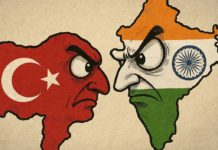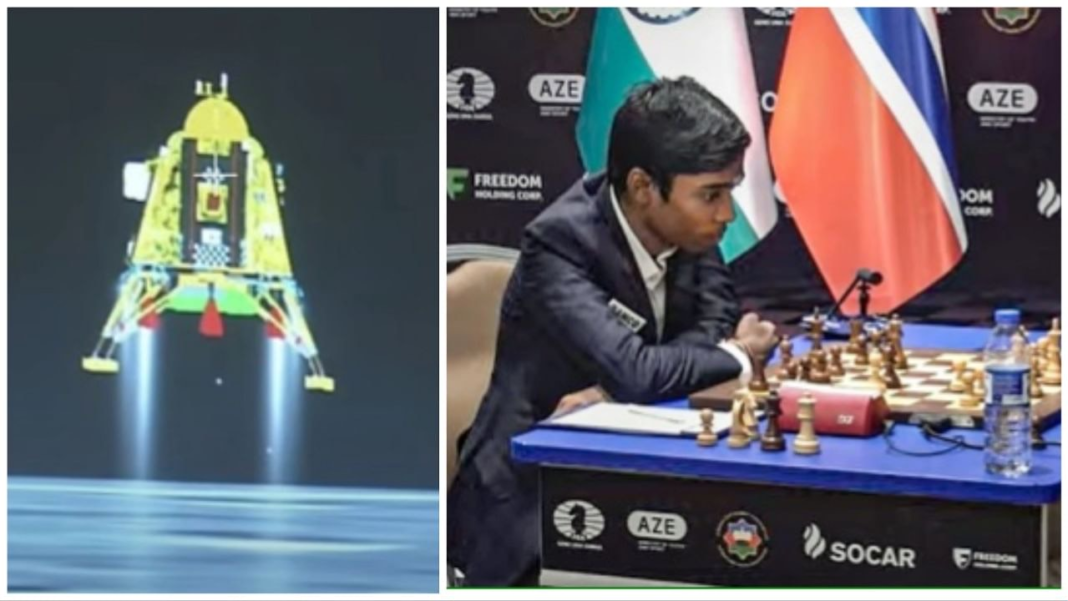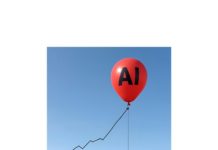MARKET PERSPECTIVE
By J Mulraj
Aug 19-25, 2023
Now we must strive to achieve an economic liftoff
India was overjoyed last week by two wonderful achievements. Space agency ISRO succeeded in landing Chandrayaan-3 on the south side of the moon, the first country to do so. And, at a fraction of the cost of other space agencies. The Chandrayaan-3 mission cost $75 m, compared, as per a CLSA report, to the $ 24 b. cost of NASA’s Artemis Space Launch system. Kudos to the scientists at ISRO for this achievement!
As Chandrayaan was reaching the moon, 18 year old chess prodigy Praggnanadhan, lovingly called Prag, reached for the stars when he entered the Chess World Cup Final, the second player from India, after Vishwanathan Anand, to do so. Following two draws against reigning champion, Magnus Carlsen, Prag lost the rapid fire round, to become runner up. India is emerging as a chess powerhouse with a lot of other talented, young, players. As a runner up, Prag has qualified for the Candidates tournament, the winner of which will earn the right to challenge the World champion, Ding Liren.
India’s value system was on display at the summit of BRICS nations (Brazil, Russia, India, China and South Africa), in Johannesburg, S. Africa. Led by S. Africa President, Cyril Ramaphosa, onto a stage where country flags were inconsiderately placed on the floor, to mark the position where the leaders would stand, PM Narendra Modi bent down, picked up and pocketed the flag, not wanting to insult it by standing on it. Seeing this, Ramaphosa followed suit, but not Xi, who blithely stepped on his flag. The world noticed.
If India wants to aim for a doubling of GDP in 8 years, it will need an annual GDP growth rate of 9%. That appears almost impossible as we have never consistently grown at that rate in the past. In 1978 India and China were roughly at the same GDP levels. In Dec 78, Deng Xiao Ping, then the Chinese Premier, embarked on a process of economic reform, one that has led, over the next 45 years, to China’s GDP becoming 5.3 times that of India, at $ 18.1 trillion, compared to India’s $ 3.38 trillion. The acceleration of China’s GDP happened mainly in the ‘80s.
In the 80s, when China’s one party system was focused on economic reform, India’s multiparty democratic system was squabbling over petty things and pursuing the benefits (personal) of power, not the progress of the country. That they continue doing so reduces the confidence in the ability to achieve the 9% CAGR in GDP needed to double it in 8 years.
The India story has a lot going for it. The JAM (Jandhan, Aadhar ad Mobile) trilogy is intended to curb subsidy leakages; in 80s PM Rajiv Gandhi had remarked that only 15% of the subsidy paid by Government reached the intended beneficiary, the rest being swallowed by middlemen. Thanks to the India Stack, a set of open AIs and digital public goods, India leads the world in digital transactions. Using it, electronic transfer of money is achieved at zero transaction cost. Any street vendor can, and does, have a bar code through which he can transact, at no cost, the smallest of deals. The added benefit is that he now has an electronic record of transactions, on the basis of which he can borrow money. Effectively, the India stack has made all citizens economically inclusive, and a part of India’s economic growth story. Besides having a zero transaction cost for electronic transactions, India has, probably, the lowest rate for telephony, and digital data transfer, globally. It’s young demography profile is hugely encouraging for the economic growth future.
While we applaud India’s achievements we must also correct its weaknesses, if we are to aim to double our GDP.
The biggest of these weaknesses is corruption. The kabuki drama of state legislators been held captive in fancy resort hotels, as they seek to subvert the electoral mandate by switching sides midway in their term, is testimony to unbridled corruption. Sadly, this has become so accepted that the rates for each MP/MLA to switch sides is narrated, like the price of a share, on public television. It is an ugly transmogrification of democracy. The electoral mandate is betrayed, the principles of the party are mangled, economic policies are jettisoned by the new dispensation, corruption continues, and the only gainers are the corrupt MPs/MLAs who collect the ransom of a kidnapped democracy. There is no way India GDP can double with such abysmal governance.
The other big weakness is delayed justice. As per this report 44% of MPs have criminal cases against them. Until the cases are disposed off by the Supreme Court, these MPs can continue in office. This provides a perverse incentive for them to continue to prevent judicial reforms. Even serious cases, filed by CBI (Central Bureau of Investigation) see judicial delays. There are 6800 CBI cases stuck in courts, some for over 20 years.
This is an ugly transmogrification of justice!
No, India cannot double its GDP until and unless the perversion of democracy through rampant corruption, and the murder of justice, through apathy and ennui, persists.
A third weakness is that the tax base is smaller, as all Governments have exempt agriculture, which supports half the population from tax. They do this not out of love of farmers but for two benefits to themselves. One is, of course, to get their votes. More perniciously, though, is how the political class, the big industrialists and the successful professionals, use agricultural tax exemption to launder black money.
The fix, if the polity is genuinely looking for it, is simple. The exemption is supposedly meant for small farmers struggling with the heat of the noonday sun, the vagaries of demand for their produce and the vicissitudes of nature. That’s fair. It ought not to be for large farmers. So, exempt farmers from tax if they earn more than, say, Rs 25 lacs a year (compared to Rs 3 lacs for others). After that, tax at normal rates. This works, except for those who launder black money by misusing the exemption.
So if our political system is rigged by 1. Making a mockery of democracy by allowing sections of political parties to cross over for lucre and power 2. They then, as law makers, delay judicial reforms, to prolong cases and deny justice, and 3. They are able to openly take bribes, with the easy availability of a laundry to clean their cash.
Do you really think, Mr Modi, that India can March ahead if such a rigged system is not cleansed?
Last week the BSE Sensex ended at 64886, down 462 points over the week.
Globally, the senseless war in Ukraine continues, with avoidable deaths and injuries. As a country Ukraine is finished. When will it’s people realize that they ought to have turned a deaf ear to Boris Johnson, ex British PM, who intervened to scuttle a settlement agreed upon by Ukraine and Russia. This was a month after the war began! A settlement would have saved some 350000 Ukrainian lives and avoided ravages to the country’s infrastructure. One wonders how Boris will explain this to St. Peter?
China’s economy is in poor shape, thanks to the travails of its realty sector (30% of its GDP) and falling exports (20% of GDP). The withdrawal of several foreign manufacturers has created a youth unemployment problem. Two of its biggest realty firms, Evergrande and Country Garden, are broke. One hopes that Xi doesn’t seek to divert attention with a military misadventure. At least he has agreed, at the BRICS meeting, to de-escalate the situation with India.
After the twin successes of space and chess Mr Modi must work on the next two, corruption and judicial reform. Good luck, sir!
Comments may be sent to jmulraj@asiaconverge.com










































COMMENTS